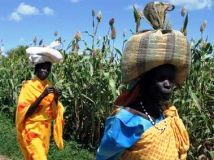Southern Sudanese ask: where’s the peace dividend?
Sept 15, 2005 (AKUEM, South Sudan) — The English-Dinka picture dictionary lying around a bush hospital in southern Sudan features objects beyond the imagination of most people here: a DVD player, telephone, tractor, stove, sink.
 Now that Sudan’s 21-year civil war is over, such images represent the kind of lifestyle the southern government — to be formed under a January peace deal — aspires to deliver eventually to its eight million people.
Now that Sudan’s 21-year civil war is over, such images represent the kind of lifestyle the southern government — to be formed under a January peace deal — aspires to deliver eventually to its eight million people.
But delays in forming the new government has dealt a blow to southerners’ hopes of a speedy escape from poverty.
Many people in Akuem, a remote mud village on the old frontline of the war fought by southern animist and Christian rebels seeking greater autonomy from the Arabic-speaking, Muslim north, are wondering how and when change will come.
Most of the villagers are still reeling from the shock death of their leader John Garang, killed in a helicopter crash on July 30. They are also coping with the worst food shortage since a famine killed at least 60,000 people seven years ago.
“There is nobody other than John Garang who has guided us. We’ve been waiting for people to tell us do this, do that. Alone we’ve been asking ourselves ‘what shall we do?’,” said labourer Luka Garang, 25.
“We think everything has gone with Dr John.”
Several weeks ago, a rumour that the rebel-turned-vice president was still alive triggered brief jubilation, with soldiers firing guns in the air and women dancing for joy.
Lack of reliable information is widespread in southern Sudan where often the only link to the outside world is a radio.
HARDSHIP UNBEARABLE FOR SOME
A burst of torrential rains, which transforms dirt tracks into impassable swampy marshland, further isolates the clusters of small villages that constitute much of the south, a region half the size of western Europe.
The lack of infrastructure used to compel Garang to fly all over the south to inform the people personally of the peace deal, which gives southerners the right to vote on independence after a six-year transition period.
Akuem is still waiting for Garang’s successor, Salva Kiir.
“The replacement should come and tell us what he knows. We don’t know anything,” said William Deng, 26, who mistakenly believes the right to secession will be determined by the president and vice-president of Sudan.
Under the January peace accord, southern Sudanese can hold a referendum on their future in six years. But as they battle disease, hunger and low levels of education, many here wonder if that will be long enough to allow the south to stand on its own.
“We are not free, we are still in a bad situation,” said David Garang, who works as a driver for a medical charity, one of the few locals to earn a regular salary. Garang is a common name in southern Sudan.
“Some of us are still drinking from the river, there are no water pumps, no food. We don’t have schools, we have no hospitals other than this one,” he said.
The hardship is more than some can bear.
Authorities in the county say that out of 55,000 southerners who this year made the arduous trek home from the north where they fled during the war, 250 have headed back disillusioned.
They have chosen to return to Khartoum and other northern cities where discrimination against their religion and ethnicity is still preferable to the poverty in their birthplace.
Abducted by militiamen at the age of six, forcibly married to an Arab in her teens, beaten by other women for refusing to undergo female circumcision, and insulted for being a Christian, Akual Thiel is thinking of returning to the source of 15 years of misery, the north.
“I will go back if things do not improve,” said the 21-year-old, who came to Akuem in March with her two children and now lives in a flimsy mud hut or “tukul” which is frequently flooded by rains.
“What I had hoped for was a husband from my tribe, then I would live with him and he would feed my children. The tukul I have is nothing.”
(Reuters)
